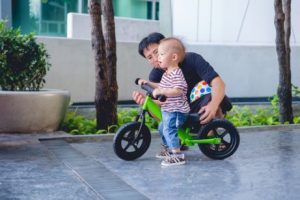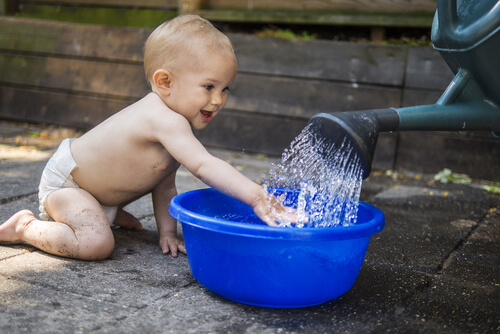The 11th Month in a Baby's Life

At 11 months of age, babies are more willing to share their toys and other objects with other people. They also begin to imitate sounds, such as animal sounds and vehicle sounds. This means their cognitive and social skills are developing. At the same time, their need for socialization increases.
Eating and your 11-month-old baby
At this age, the skill that babies show is incredible. It’s obvious that they have an improved hand-eye coordination by now. In other words, 11-month-old babies can perform various movements very easily. This includes grasping foods and putting them in their mouths.
They are also able to chew these foods, whether or not they have teeth. Babies that don’t have any teeth yet will still use their gums to chew. Therefore, parents can start adding more proteins to soups and fruit juices, and can also add more vegetables and yogurt to a child’s diet.

Activity and rest times with 11-month-old babies
- During this stage of life, babies still tend to sleep quite a bit. However, babies are often unpredictable so this can vary.
- It’s normal for children at this age to continue waking often, whether they’re boys or girls. It’s not until around age 5 or 6 that children achieve a mature sleeping pattern.
- This is the stage in which babies start to get to know themselves. They begin establishing visual and physical contact with their caretakers and everything around them.
- By the 11th month, children start to move about with more ease.
- Little ones can grasp objects and are able to crawl on their own. They can also turn over with greater ease and skill.
- At 11 months, babies also begin to demonstrate a desire to try to walk on their own, without assistance.
How do babies develop neurologically during this stage?
From the time babies reach their 11th month of life, the myelin (white matter) production has increased. The number of neurons (gray matter) in their brain has also increased.
At 11 months of age, babies acquire and develop the following:
- Sitting up. By this age, most babies can sit up on their own. Their movements are quick and more coordinated.
- Babies also start to pronounce their first two-syllable sounds with a purpose.
- These babies have an increased ability and desire to explore the world around them.
- Many babies start taking their first steps with the help of other people or objects.
- They hold onto objects more easily.
- Babies can now distinguish between different people. They start to show preference towards those they know over strangers.
- This is also the time in which many babies start to say their first words.

Skills and activities
This is the time in which babies typically start pointing to different things with their index fingers. They also start sticking their fingers in slots and holes and explore through their sense of touch.
If you haven’t done so already, be sure to “babyproof” your home by covering up electrical outlets and keeping electrical cords out of reach.
Babies acquire the ability to differentiate between different objects and point to them. They also acquire the ability to throw a ball, place objects in a box, hold a spoon by its handle, etc.
Their achievements lead them to express emotions and, therefore, applaud, laugh, etc. Little ones imitate the sounds they hear and use their voices to get the attention of others instead of crying.
When it comes to putting a shirt on 11-month-old babies, they will often stretch out their arms to actively participate in the process. In the same way, they may offer their feet when parents are putting on or taking off their shoes.
At this stage, babies can distinguish and correctly identify both mom and dad. At the same time, they start to acquire a better mastery of certain abstract knowledge. For example:
- Up and down.
- Numbers 1 and 2.
- They can respond to questions like: Where is daddy? or Where is your foot?
All of these activities demonstrate the skills that babies develop during their 11th month of life.
At 11 months of age, babies are more willing to share their toys and other objects with other people. They also begin to imitate sounds, such as animal sounds and vehicle sounds. This means their cognitive and social skills are developing. At the same time, their need for socialization increases.
Eating and your 11-month-old baby
At this age, the skill that babies show is incredible. It’s obvious that they have an improved hand-eye coordination by now. In other words, 11-month-old babies can perform various movements very easily. This includes grasping foods and putting them in their mouths.
They are also able to chew these foods, whether or not they have teeth. Babies that don’t have any teeth yet will still use their gums to chew. Therefore, parents can start adding more proteins to soups and fruit juices, and can also add more vegetables and yogurt to a child’s diet.

Activity and rest times with 11-month-old babies
- During this stage of life, babies still tend to sleep quite a bit. However, babies are often unpredictable so this can vary.
- It’s normal for children at this age to continue waking often, whether they’re boys or girls. It’s not until around age 5 or 6 that children achieve a mature sleeping pattern.
- This is the stage in which babies start to get to know themselves. They begin establishing visual and physical contact with their caretakers and everything around them.
- By the 11th month, children start to move about with more ease.
- Little ones can grasp objects and are able to crawl on their own. They can also turn over with greater ease and skill.
- At 11 months, babies also begin to demonstrate a desire to try to walk on their own, without assistance.
How do babies develop neurologically during this stage?
From the time babies reach their 11th month of life, the myelin (white matter) production has increased. The number of neurons (gray matter) in their brain has also increased.
At 11 months of age, babies acquire and develop the following:
- Sitting up. By this age, most babies can sit up on their own. Their movements are quick and more coordinated.
- Babies also start to pronounce their first two-syllable sounds with a purpose.
- These babies have an increased ability and desire to explore the world around them.
- Many babies start taking their first steps with the help of other people or objects.
- They hold onto objects more easily.
- Babies can now distinguish between different people. They start to show preference towards those they know over strangers.
- This is also the time in which many babies start to say their first words.

Skills and activities
This is the time in which babies typically start pointing to different things with their index fingers. They also start sticking their fingers in slots and holes and explore through their sense of touch.
If you haven’t done so already, be sure to “babyproof” your home by covering up electrical outlets and keeping electrical cords out of reach.
Babies acquire the ability to differentiate between different objects and point to them. They also acquire the ability to throw a ball, place objects in a box, hold a spoon by its handle, etc.
Their achievements lead them to express emotions and, therefore, applaud, laugh, etc. Little ones imitate the sounds they hear and use their voices to get the attention of others instead of crying.
When it comes to putting a shirt on 11-month-old babies, they will often stretch out their arms to actively participate in the process. In the same way, they may offer their feet when parents are putting on or taking off their shoes.
At this stage, babies can distinguish and correctly identify both mom and dad. At the same time, they start to acquire a better mastery of certain abstract knowledge. For example:
- Up and down.
- Numbers 1 and 2.
- They can respond to questions like: Where is daddy? or Where is your foot?
All of these activities demonstrate the skills that babies develop during their 11th month of life.
This text is provided for informational purposes only and does not replace consultation with a professional. If in doubt, consult your specialist.








